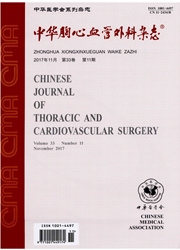

 中文摘要:
中文摘要:
食管鳞癌(esophagealsquamouscellcarcinoma,ESCC)是常见的恶性肿瘤之一,对ESCC预后评估的常用手段是TNM分期,但临床常有预后与分期不符的现象,可能的原因除包括现有的食管癌临床分期手段有限和不准确外,还可能存在TNM定量分期诊断以外的预后影响因素。其中寻找ESCC预后判断与疗效预测分子的研究受到了广泛的重视。我们在单一手术组接受单纯手术的153例ESCC患者石蜡包埋组织切片中检测12种蛋白分子的表达,并验证它们的表达与患者预后的关系,结果发现仅有P21、E—cadherin和COX-2的表达与患者预后相关,并且是ESCC患者的独立预后因素。
 英文摘要:
英文摘要:
Esophageal squamous cell carcinoma(ESCC) is a common malignancy in china, and TNM staging is the standard staging system for ESCC. However, in clinical practice, patients' prognosis is not always consistent with the staging. This phenomenon may be attributed from the fact that the current limitation and imperfect of the TNM staging system, and besides, another possible reason might be that some prognostic factors for ESCC other than TNM descriptors may exist. Among all the prognostic factors for ESCC, molecular biomarkers received widely concern. We searched the literatures and identified 12 molecular biomarkers that received the most concern and validated them in our single surgeon team. The results showed that only P21, COX-2 and E-cadherin were significant prognostic factors for ESCC in this series. Therefore, in the current study, we reviewed the literature regarding the prognostic significance of the above mentioned three hiomarkers for clinical reference.
 同期刊论文项目
同期刊论文项目
 同项目期刊论文
同项目期刊论文
 期刊信息
期刊信息
